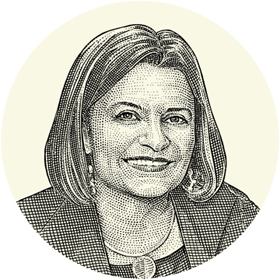
You have heard this story before—it’s not a new one. It goes like this: A young woman with great promise and potential enters Wellesley with the intention of studying one subject, falls in love with another discipline while on campus, and finds a way to combine the two into a successful career. Sound familiar?
Wellesley continues to be a place where women discover their passions. It is a place that prepares women for leadership and success, and instills in them the confidence to achieve, no matter the field or industry. Since Henry Durant’s days, Wellesley has provided the environment, the opportunities, and the resources that enable women to become the very best version of themselves.
Or, as Hillary Rodham Clinton ’69 said this summer: “No place in my life was more formative than Wellesley in showing me what women can accomplish when our potential is unleashed.”
When I think about the effect of unleashing that potential, I think of the many Wellesley women who are making a difference in the world. Alumnae like Julieta Valls Noyes ’84, who was inspired by faculty to create her own independent major in international studies (before such a major existed on campus), and who recently was confirmed as the United States Ambassador to Croatia. Or alumnae like Rebecca Spyke Keiser ’91, who majored in Japanese studies at Wellesley and was recently named head of the National Science Foundation’s Office of International Science and Engineering. Or like all the alumnae whose stories fill the pages of this magazine four times a year.
There are advantages in going to a women’s college—and, specifically, in going to Wellesley. As Adeline Lee ’16, the current College Government president, recently said, “I was drawn to this place not because of an absence of men … but, rather, because of the sheer presence of women.” With rigorous classrooms that are of women, for women, and by women, students gain the kind of confidence that enables music majors to go to business school, science majors to write poetry, or humanities majors to work in the sciences. What better place than Wellesley, what better environment than our beautiful campus, for a young woman to contemplate her role in the world and figure out how she can and will make a difference?
Another advantage is the lifelong friendships that form here. Studies show that friendships developed at women’s colleges persist longer than others. How else can you explain why four Wellesley women from the class of 1943 keep up a “round robin” letter circuit more than 70 years after graduation? Or why, at age 95, an alumna told me that the greatest gift Wellesley gave her was her lifelong friends? Or why alumnae insist on rooming with their old friends in the residence halls during reunion each year? The Wellesley network is a testament to the kinds of friendships and connections that form on campus and the sense of belonging that lasts forever.
Wellesley is and has always been a singular educational experience because of the dedicated people who ensure it is so. Wellesley faculty not only remember their students long after graduation, they keep in touch with them. This past reunion, one former faculty member returned to Wellesley from the West Coast to connect with his students from 50 years ago.
The Wellesley experience transcends generations of Wellesley women: It’s an experience in which you learned the power of acquired knowledge, the advantage of clear thinking, and the comfort of supportive sisters. It is where you acquired important skills: your study habits, your flexibility, your adaptability. Those skills continue to be no less important for today’s students, as their journey after Wellesley will no doubt include some twists and turns along the way, leading them to unexpected places. Last year, a young alumna wrote to me about how, after working for a year on Wall Street, she decided to change direction and follow her passion in the geosciences, crediting Wellesley for giving her the courage to pursue her dream.
All told, these stories are powerful examples of potential unleashed. They are, collectively, the Wellesley story. As we advance Wellesley, we perpetuate the positive, tangible effect of Wellesley women in the world. Advancing Wellesley, perpetuating the Wellesley Effect, is good for Wellesley women, and it is good for the world.





